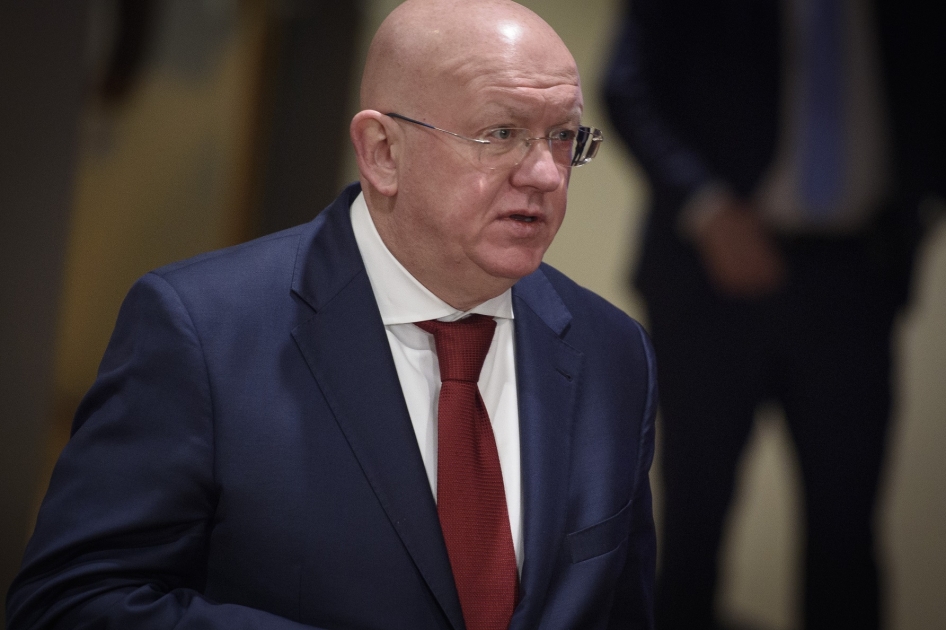Remarks to the Press by Ambassador Vassily Nebenzia, Permanent Representative of the Russian Federation to the United Nations, following the Tribute to Ambassador Vitaly Churkin
Q: What is happening now on Venezuela and Russian draft resolution on this matter?
A: Nothing is happening on the resolution as of now. We are very concerned about what will happen on the 27 of February. We hope that it will not lead to anything bloody, that it will not be a thing that would provoke civil unrest. We want it peaceful, that is obvious.
Q: If troops were coming from any other country, would Russia support the Maduro government with any military force?
A: Russia supports the UN charter, independence, territorial integrity and sovereignty of Venezuela. Russia is categorically against this regime change that we see is being implemented. I have been answering that question before. There is nothing that I know about any foreign troops coming to Venezuela. And I hope that there are no foreign troops whatsoever coming to Venezuela from whatever country.
Q: Have you heard anything at all about a challenge to the credentials of the Maduro government at the UN?
A: Some vague rumors about it.
Q: Ambassador, we know that yesterday one of the military advisors for the mission of Venezuela declared his loyalty to Juan Guido as the legitimate president of Venezuela. What is your reaction to this?
A: No, no reaction. We have the legitimate Venezuelan Mission here at the United Nations. Their credentials are valid. We do not see any reason why we should pay attention to this at all.
Q: Ambassador, can I ask you about another issue. We have a very important diplomatic meeting taking place next week between Supreme Leader Kim and President Trump. What do you hope will come out of this meeting? Do you think it is time for the Security Council to respond in some way to this controversy?
A: We all invest hopes in this meeting. We hope it will end in positive results. We were of conviction and we still are, that the road towards progress on this track is a mutual coming to each other. We have always said that. We want to see progress in the denuclearization issue, and reciprocal progress on encouraging North Korea to move in this direction. We really wish success to the summit we are interested in resolving this nuclear issue, but this is a very complex thing. You cannot expect to solve it at a two-day meeting. This is a long road but we should embark on it.
Q: Lifting sanctions to encourage further conversations?
A: That has been our long-standing position. First we have to separate the nuclear issues and the needs of the people. We need to encourage humanitarian supplies to North Korea. We think that it is appropriate to encourage them economically, and that might necessitate lifting, at least partially, some of the sanctions.
Q: Ambassador, I have a question on another issue, which is India and Pakistan. What does Russia think of the latest developments? Should the Council issue a statement on this topic?
A: We deplore terrorism in whatever forms. We heard some conflicting messages on how it happened and who did that. Our position is: we need more details and more information before we make a decision on that. I know that there are some conversations about the possible reaction, but that is in the making so far.
Q: Ambassador, can I ask you about General Assembly that today holds talks on Ukraine? What do you expect of this debate? Is there International concern about what is going on in Ukraine, in Donbass?
A: I think that unfortunately there is too little international concern about what is going on in Donbass and about the sabotage of the Ukrainian authorities who do not implement the Minsk agreements. We spoke about it in the Security Council a few days ago. In fact, it was on the fourth anniversary of adopting the Minsk Agreements and the Package of Measures. We will also speak about it today. You will hear a bit later.
Q: Ambassador, we know that Venezuela has recently closed its ocean border. What is your reaction to this? We know that you send medical aid to Venezuela and that President Maduro announced he would gladly receive help from Russia?
A: Aid should not be imposed, it should be welcome. If legitimate authorities of Venezuela welcomed aid from wherever it came, that would be fine. Whether to close or open the borders is Venezuela’s sovereign decision.
